Analysis of Satisfaction of Small Cucumber Contract Famers in Predominantly Agriculture areas in Sri Lanka-Juniper Publishers
Juniper publishers- Social Sciences
Abstract
Contract farming is gradually increasing in last
three decades in Sri Lanka. Contract farmers are the only investment
with the possibility for producing infinite return to the organization.
Thus, it is critically important to attracting best contract farmers to
the organization as well as make effort to retain them in the
organization too. Low retention rate of Contract farmer is a common
problem in every agricultural organization. With the alternatives
production, retention of contract farmer in an organization is
challenging not much easy task. In case of retention of contract farmer,
their satisfaction is remarkable factor. Therefore, identification of
factors effect on retention and satisfaction of contract farmers has
become a much controversial topic to that can be studied much deeper.
These studies based on identify the factors effect on
retention and satisfaction of contract farmers in small cucumber
cultivation. The study has been conducted through 90 contract farmers in
three districts. According to the findings experience (r=0.1299,
p=0.0000) and job status (r=0.0638, p=0.0000) are positively effect on
satisfaction and retention but age (r=-0.0048, p=0.0000) is negatively
affected. Contract farmers satisfied with training program provided by
organization, land preparation practices, yield in small cucumber
cultivation. Poor farm gate price, timely not money receiving like
organizational factors and difficult of pest controlling, harvesting
reduce retention of contract farmer. Findings of the study enable the
Companies management to understand the reason behind the lower level of
retention in contract farming.
Keywords: Contract Farmers; Retention; Satisfaction
Introduction
With the ever-increasing competition of the
agricultural business world, most of the private sector contracts
farming providers are also in the phase of increasing their profits. The
techniques of contract farming which are used for the profit
enhancement is occasionally giving positive outcomes as well as negative
outcomes. Efficiencies and productive farmer community vital assets for
achieving a higher level of performance in an organization [1].
Satisfied farmer community leads to enhance effort to cultivation
performance, so that maintaining of satisfied contract farmer in an
organization is crucial factor. To maintain the well-being of an
organization management tries to create a highly satisfied farmer
community. Therefore, organizational management places a noticeable
reliance on their individual farmer performance to gain higher
productive cultivation [2,3].
These conditions are leading the contract farmers in
the organization to going through a condition of farmer’s job
satisfaction which directly affects day today cultivation practices.
Together with these facts, there is a new trend in the agricultural
academic societies in search of factors that are affecting the level of
job satisfaction condition as well as searching the relationships among
the job satisfaction conditions and the contract farmer’s performances
[4].
The aim of this research study is to identify the
factors effect on job satisfaction level of the contract farmers on
small cucumber cultivation in predominant agriculture areas such a s
Ampara, Thabutthegama & Pollonnaruwa in Sri Lanka. When a contract
farmer satisfied about the farming contract they are tending to motivate
to do higher effort to the cultivation performance. Ultimately it
increases organizational overall performance by increasing continues
proper supply to export market [5]. On the other hand, a satisfied
farming community & their effort & commitment to cultivation
practices are vital for successfulness of organizational goals &
objectives. Therefore, the address research problem of this study is
that; Satisfaction factors which effect on contract farming [6].
Problem Statement
Small cucumber export market mainly depend on
continues product supply to the market. The continues repetition of
contract farming in small cucumber ensure continues small cucumber
supply to the market. When there is an insufficient supply, company must
import Small cucumber from India and USA and re-export by spending huge
cost. Farmers are tending to renew their contract agreement when farmer
are satisfied with the existing contract farming activities. Analysis
of farmer satisfaction on small
cucumber contract farming is vital to increase the profitability of
the company [7-9].
During the past few decades, in this small cucumber export
private company contract farmer’s repetition of cultivating
small cucumber level has decreased significantly. According
to the Supply chain department’s sources in 2016 since the
organization has implemented lots of strategies changes to the
contract farming of the organization, most of the farmers has
faced various organizational challenges and those challenges
has decreased the satisfaction level of the contract farmers of the
organization. According to Bommanahalli and Rangappa, (2016)
contract farmers found to be using improved farming practices
in maize production. According to Aziri [10] research emphasize
that contract farming enhances farmers knowledge, attitude &
agronomic practices about small cucumber farming.
As indicated by the Asian Development Bank (2008) a “farmer–
endeavor” association for industrialization of agribusiness can be
deciphered as the model of agreement cultivating that is generally
drilled in numerous nations. It is by and large acknowledged that
economical, efficient, and impartially executed contract cultivating
can bring advantages to the two ranchers and the endeavors [11-
15].
Justification of the Problem
It is identified that satisfaction of contract farmers to work
to achieve higher amount of cultivation & repetition, as well as
dissatisfaction of contract farmers will decrease the cultivation
area & increase the non-repetition. Because of dissatisfied
contract farmers continuous small cucumber export is breaking
that problem of the finally decrease the organizational profit &
reputation [16]. According to the Organization 2016 financial
report it was then found a significant reduction in the repetition
of small cucumber contract farming of the organization by 45%
compared to the previous year (2015).
It was also found that there is a significantly higher percentage
of small cucumber production deduction compared to the previous
years and the previous record prevailing with the records of the
organization. All in all, these all factors and figures are providing
enough evidences for the occurrence of lower satisfaction level
with the contract farmers of the organization [17-20]. As per
the Asian Development Bank Report in 2015 underlined that
farmer– endeavor organizations ought to be built up to pull in
more speculations into horticulture and provincial regions, and
to assemble a market-situated rural innovation augmentation
framework. The administration has constantly considered contract
cultivating as an essential intends to reinforce farmer– endeavor
associations [21-23]. As indicated by the Lieping [24] the way that
ranchers are unwilling to go into contract cultivating additionally
captures the improvement of farmer– endeavor organizations.
Numerous examinations additionally detailed that the satisfaction
rate of agreement cultivating in the China was low [25].
Objectives of the Study
The researcher is trying to achieve the below mentioned
objectives by conducting this research study [26].
General Objective
a) To study the existing small cucumber contract farming
cultivation under leading export pvt. group of company and
analysis the farmer satisfaction towards the of contract farming to
reduce farmer dropout rate [27].
Specific Objectives
a) To ascertain the existing small cucumber contract
farming under leading export company
b) To analysis of farmer satisfaction toward small cucumber
contract farming.
c) To give recommendation and suggestion to enhance
contact farming of small cucumber [28].
Research Design and Research Methodology
The key motive of this descriptive research method and the
descriptive research design is mainly to investigate the relationship
of the contract farmer’s job satisfaction level and the impact of
those job satisfaction levels towards the contract farming in small
cucumber cultivation [29]. The specific organization selected
for the simplification of the overall work was the main small
cucumber export private company of Sri Lanka.
This research base on to seek the “Impact of contract farmer’s
satisfaction level on the small cucumber cultivation: a study of
small cucumber export organization of Sri Lanka. Primary data
was collected from pre-tested structured questioner, which
specially design and given selected group. Secondary data was
collected from previous researches, journals, and government
publications etc which are specifically focused on the farmer
satisfaction and the contract farming [30-33]. As mentioned in the
conceptual model and as elaborated in the hypothesis also, the
independent variables were the contract farmer ‘s satisfaction’.
As per the dependent variable, the most significant variable of
the research which was the ‘small cucumber cultivation related
performance’ was used. It does mean whether repetition or not.
Population, Sample and Sampling
In this study to seek the influence of farmer satisfaction
towards the small cucumber cultivation. Mainly focus group was
the currently engaging farmers of the organization. Though it is
obvious that the compilation of data from the all districts and
making necessary data bases for the purpose of the accuracy of the
data and the accuracy of the data interpretation when it comes to
the generalization of the final results and discussions; the chosen
study areas were restricted to the Ampara, Pollonnaruwa &
Thambutthegama districts due to the time limitation in collecting
the data and the budget constraints of the study. After all the final
sample of the study would be a compilation of the given below
[34-38].
Data Collection Techniques
In a quantitative research there are several data collection
methods, there two source of data such as Primary data and
secondary data. Primary data gathered from actual research
events. Secondary data gathered from previous articles, journals,
government publications. According to this research secondary
data was analyzed by a quantitative manner. Pre-tested questioner
did help in achieving this task. It also could be two ways such as
personally administrated and interview. Since the limitations
pertaining to the research as well as to the researcher (time
constraint and the budget constraint) the method which was
used for the collection of data was that the use of pre tested
questionnaire by interviewed of 20 contract farmers in one
district for the purpose of obtaining the data has first been
granted the required permission from the upper management of
the organization [35].
The sample was selected through simple random sampling
and the areas from the Ampara, Pollonnaruwa & Thambutthegama
districts were chosen through purposive sampling. The key motive
of using the simple random sampling for the sample selection was
that to maintain the accuracy of the data which has been generated
and to increase the probability for the research to be published
in peer reviewed journals or any relevant standard publication
materials as a final step of the carrying out of a successful research
[36].
Results and Discussion
Frequency Distribution of Age
According to the Pearson correlation test for age r= -0.0048
(95% confidence interval). When age is increasing job satisfaction
will decrease. Have a negative correlation. There were 34.4%
contract farmers in 31-40 years’ age range. In the range of 41-50
age categories, there were 33.3% of the respondents, and in 51-
60 years’ category 24.5% of the contract farmers. It was observed
that only 7.8% of the respondents were in the age range of above
60 years (Figure 1).
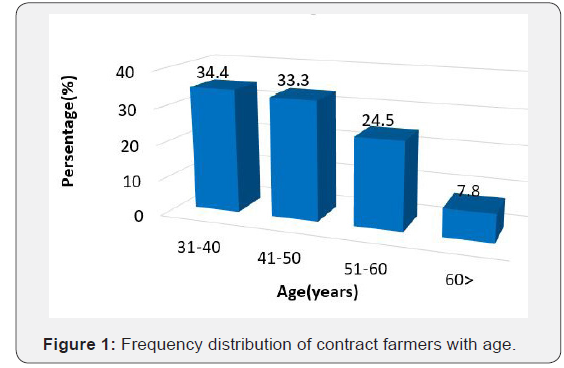
Frequency Distribution of Job status
According to the analyzed data most of the contract’s farmers
(76%) only engage with agriculture.24% contract farmers doing
agriculture simultaneously with other status such as government,
private employment. According to the Pearson correlation value
job status and job satisfaction has positive relationship. (r=0.0638,
p=0.0000 at 5% significant level) (Figure 2).
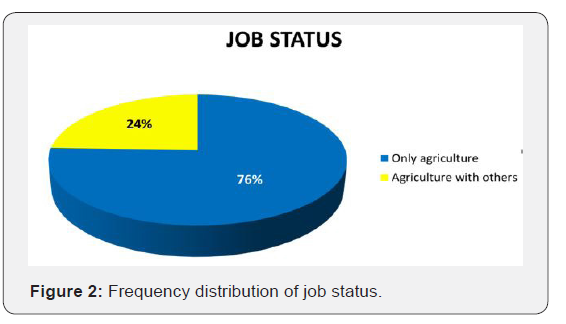
Frequency Distribution of Civil Status
94% of contract farmers were married and only 6% of contract
farmers were single (Figure 3).
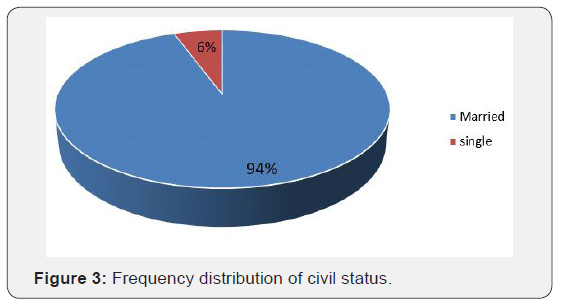
Frequency Distribution of Agricultural Experience
According to the sample 38.9% of farmers have 13-16 years in
agricultural experience. In the range of 9-12 experience categories,
there were 33.3% of the respondents, and in 5-8 years category
16.7% of the contract farmers. It was observed that 8.9% of the
respondents were in the 17-20 range and only 2.2% of contract
farmers above 21 years experiences (Figure 4).
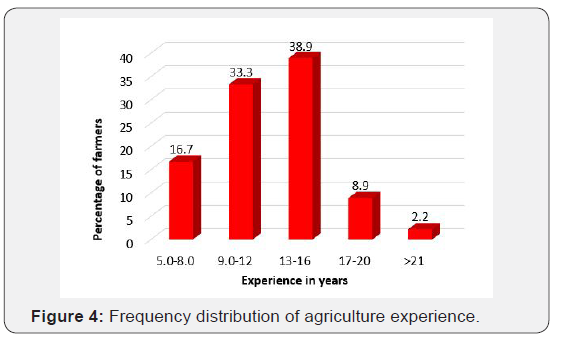
Cultivation
More than half (61.1%) of contract farmers have 1-5 years’
work experience in small cucumber cultivation.6-10 years it was 26.7% and 11-15 category there was 11.1% and only 1.1%
contract farmers have 16-20 years small cucumber cultivation
experiences. According to the correlation value r=0.1299 (at 95%
confidence interval) experiences positively correlated with job
satisfaction (Figure 5).
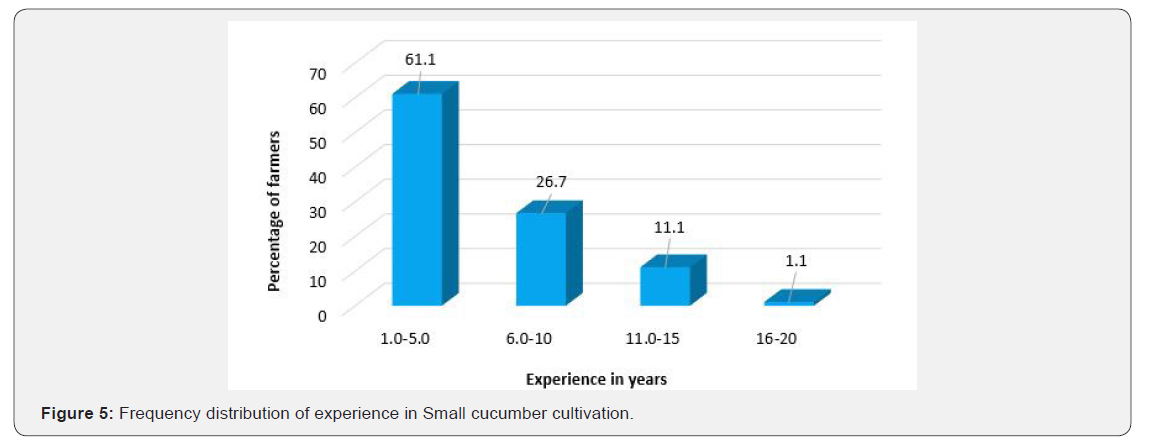
Frequency Distribution of Different Cultivation Pattern
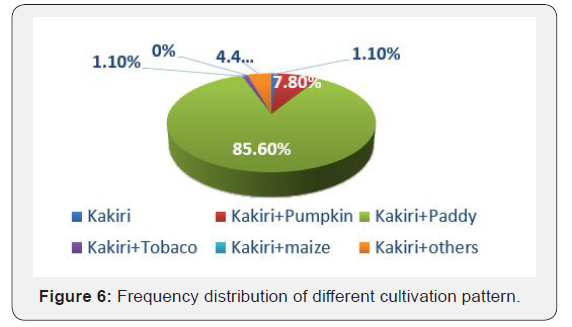
There was only 1.1% very small amount of contract farmers
cultivate only in small cucumber. 85.6% very high amount of contract
farmers cultivate small cucumber with paddy cultivation.
Other contract farmers are cultivating small cucumber with paddy
and pumpkin (Figure 6).
Variation of Small Cucumber Cultivation Land with Different Seasons
According to the secondary data (organizational annual
reports 2014-2017) it clearly shows land areas diminishing with
the time [37]. Land amount in Yala season greater than comparing
with yala-off and maha season. Lowest amount of small cucumber
land can be seen in maha season (Figure 7). Contract farmers’
satisfaction about small cucumber cultivation practices special
reference to land preparation. In small cucumber cultivation very,
simple land preparation can identify. Contract farmers were highly
satisfied with land preparation practices.it was 57%. 33% were
satisfied with land preparation (Figure 8).
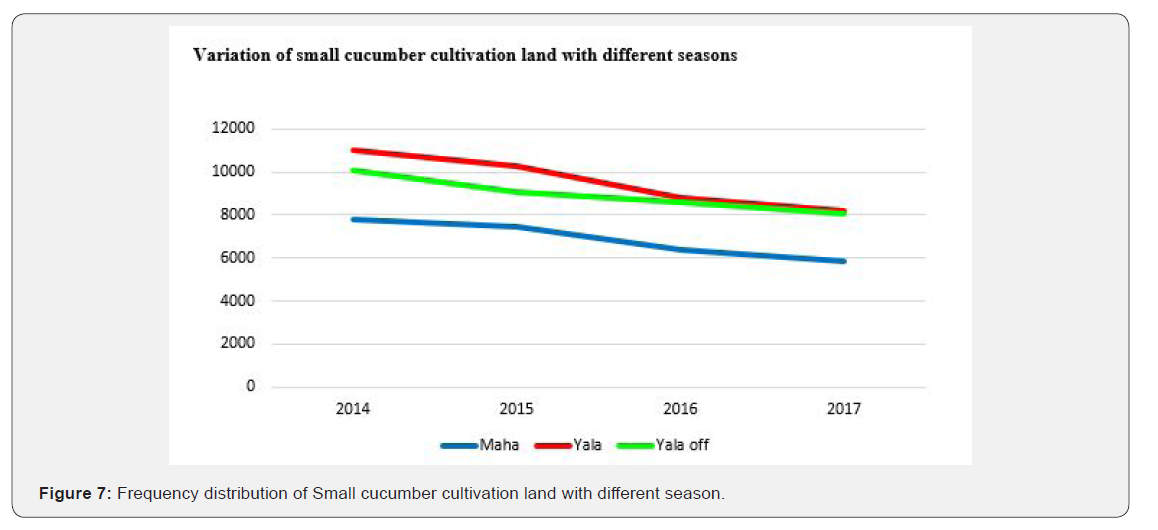
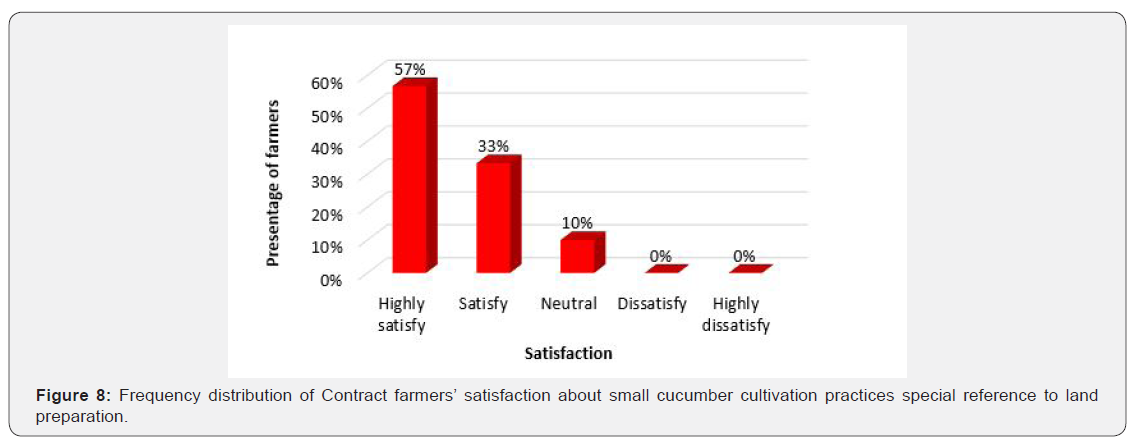
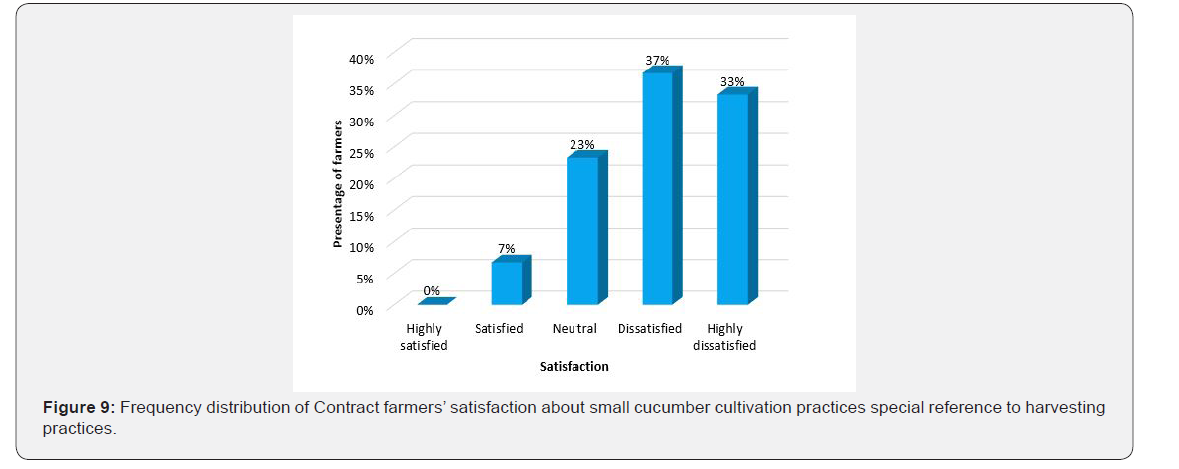
Contract farmers’ satisfaction about small cucumber
cultivation practices special reference to harvesting practices
(Figure 9). Daily harvesting is vital in small cucumber cultivation.
It is labor extensive practice and somewhat difficult practice
comparing to other crops. 37% of contract farmers under the
dissatisfied category and 33% under the highly dissatisfied level.
There were only 7% contract farmers satisfied about harvesting
practices [38,39].
Contract Farmers’ Satisfaction About Income Receiving
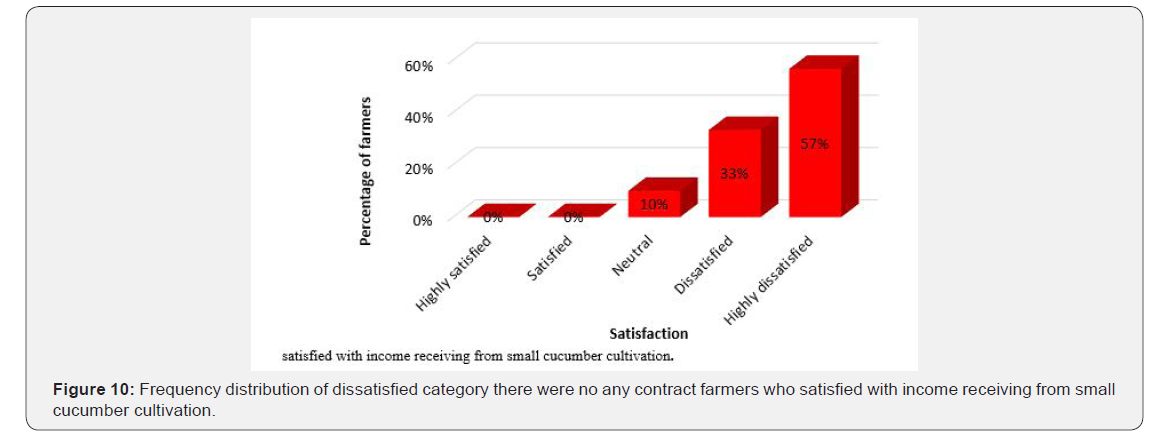
More than half (57%) of contract farmers highly dissatisfied
with their income coming from small cucumber cultivation.33%
of contract farmers under the dissatisfied category there were no
any contract farmers who satisfied with income receiving from
small cucumber cultivation (Figure 10).
Contract Farmers’ Satisfaction About Farm Gate Price
Majority (77%) of contract farmers dissatisfied with their
farm gate price.17% of contract farmers are highly dissatisfied
with farm gate price [40-42]. There was no any contract farmer
who satisfied with farm gate price (Figure 11).
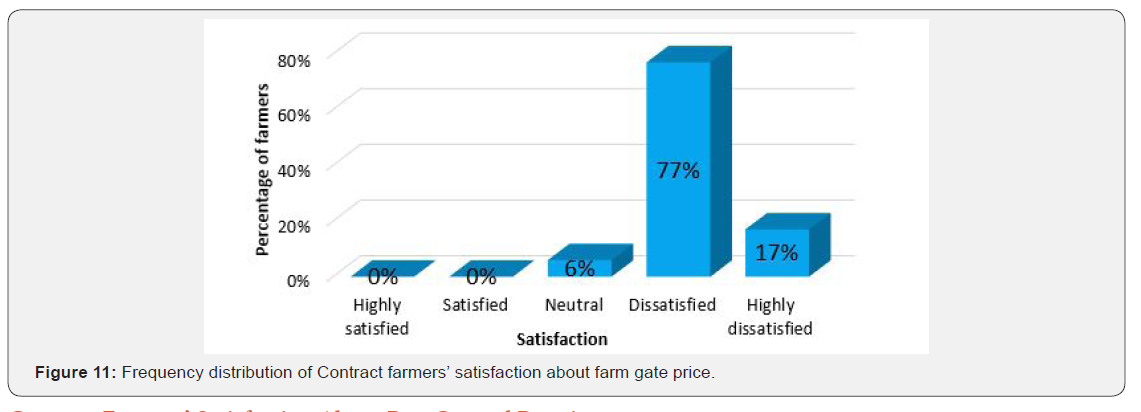
Contract Farmers’ Satisfaction About Pest Control Practices

In small cucumber cultivation pest control is crucial practice.
50% of contract farmers were dissatisfied about pest control
practices.13% were highly dissatisfied with pest control practice.
No any contract farmer satisfied with pest control practice (Figure
12).
Contract Farmers’ Satisfaction About Timely Receiving Money
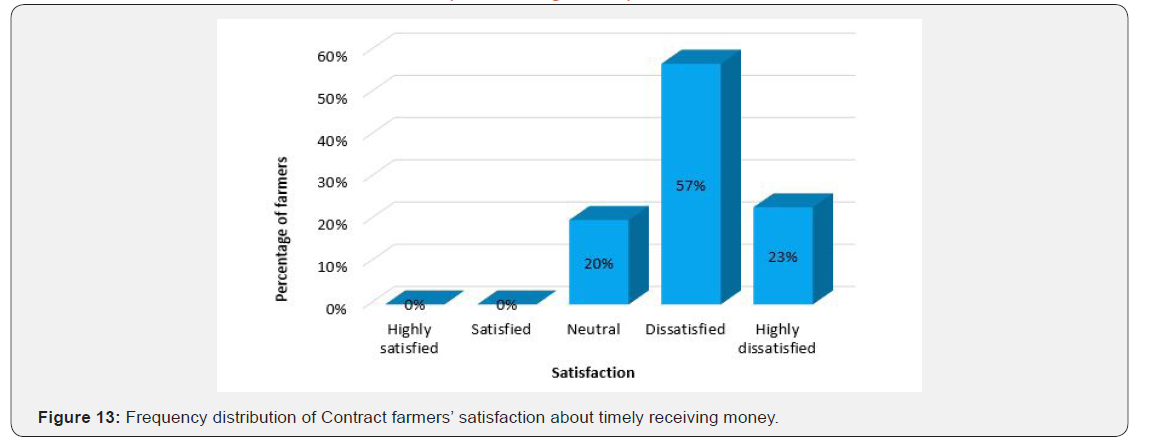
Majority (57%) of contract farmer dissatisfied about timely
money receiving. 23% contract farmers highly dissatisfied about
timely money receiving factor (Figure 13). Wilcoxon sign rank test
for Training, Yield, Income, Farm gate price, Pest control, Money
receiving. According to the Wilcoxon sign rank test p value is less
than 0.05 (<0.05=p) in analyzed factors. Training, yield, income,
farm gate price, control practices and timely money receiving
factors were significantly affect on contract farmer job satisfaction
(Table 1).

Conclusion and Recommendations
Contract farmers are the key persons and main responsible
person’s development of cultivation. This become true when the
contract farmer satisfied with their cultivation, it will directly have
affected to the effective and efficiency of the contract farmers at
the field. To achieve organizational goals and objectives it is vital
to identify the individual contract farmer satisfaction level toward
the cultivation. In this research, basically its main objective was
to study the existing Small cucumber contract farming cultivation
under pvt group of company and analysis the farmer satisfaction
towards the of contract farming to reduce farmer dropout rate job
satisfaction level.
Here in this study consider about 90 contract farmers in
Ampara, Pollonnaruwa & Thambutthegama areas. There is
only limited number of researches are available to identify the
satisfaction level of contract farmer with special reference to the
Sri Lankan agricultural private organization. The aid of survey
method for data gathering and it was utilized Pearson correlation
analysis; Wilcoxon sign rank test and descriptive statistics for data
analysis. One of the major conclusions that can be drawn from the
study result is that difficulties occurred in cultivation practices
especially in harvesting and pest controlling. Contract farmers
satisfied about their training received and yield from small
cucumber cultivation. Poor organizational practices like lower
farm gate price, money not receiving timely to contract farmer
reduce continues small cucumber contract farming.
Recommendations
The following recommendations are forwarded to organization
to enhance the satisfaction performance of the contract farmers to
the highest level.
a) According to the analyzed result concluded that the
young age was significant in their satisfaction. Hence, in the
farmer selection process give priority to that young farmer
with agricultural background.
b) Enhance small cucumber farm gate price.
c) Develop standard system for effective money transferring
to contract farmer.
Ex- “On the Spot Money Transferring Method”
a) Develop innovative methods for harvesting and pest
controlling.
Enhance the awareness about intergraded pest management
instead to chemical application among contract farmers.
For More Articles in Annals
of Social Sciences & Management studies Please Click
on: https://juniperpublishers.com/asm/index.php
For More Open
Access Journals In Juniper Publishers Please Click
on: https://juniperpublishers.com/index.php



Comments
Post a Comment